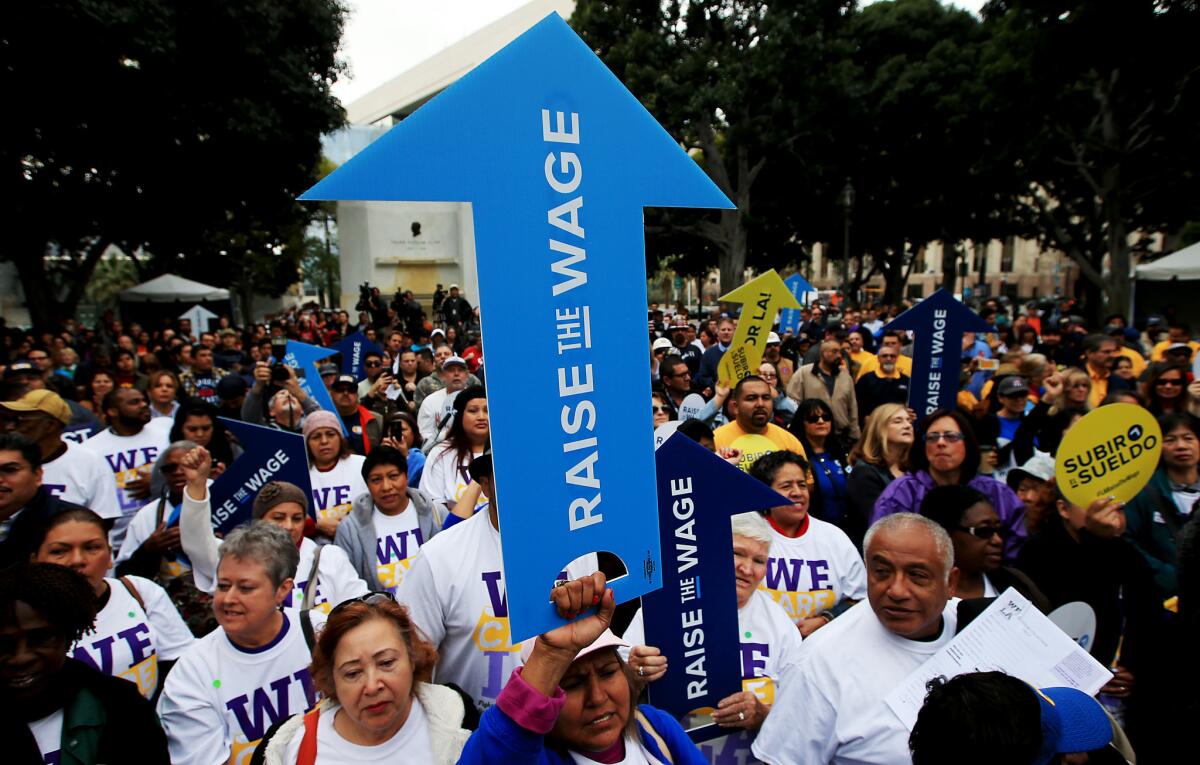Can a higher minimum wage save lives by reducing suicides?

Could an increase in the minimum wage save American lives and make them longer in the process?
The answer appears to be yes.
New research reveals that when U.S. states raised the minimum wage by a single dollar, suicide rates fell among residents clustered around the bottom rung of the socioeconomic ladder.
And the higher the unemployment rate, the stronger the link. When a state’s jobless rate topped 6.5%, a $1 boost in the minimum wage was followed by a roughly 6% drop in the suicide rate among working-age adults with a high school degree or less — in other words, among those most likely to work in minimum-wage jobs.
But even in periods of low unemployment, when the jobless rate dropped to 3%, suicides still declined by 3.5% among the least educated after their states mandated a $1-per-hour minimum pay raise.
The researchers found no link between minimum wage hikes and suicide among Americans with a college degree.
The study, which spanned 26 years, offers fresh evidence that the link between income and mental health is powerful. And it strengthens the argument that policies that shore up the incomes of low-wage workers can be lifesavers for those who live paycheck to paycheck.
The findings were published this week in the Journal of Epidemiology & Community Health.
“It’s important to know that there are levers we can pull at a societal level to improve people’s well-being,” said study leader John Kaufman, a doctoral candidate in epidemiology at Emory University’s School of Public Health in Atlanta. Since for every completed suicide in the U.S. there are close to 30 attempts, a wage increase is likely to improve the mental health of a wider population than the study could show, he said.
The Brookings Institution has calculated that 53 million Americans between 18 and 64 — 44% of all U.S. workers — qualify as “low-wage.” These employees are paid a median hourly wage of $10.22, which is higher than the $7.25 federal minimum wage ($2.13 for workers who earn tips) but lower than the generally accepted “living wage” standard in many regions. And their median annual earnings are about $18,000.
Fourteen states have the same minimum wage as the federal government, and seven have a lower — or no — minimum. In recent years, 15 states have acted to raise their minimum wages in the next two to three years, and nine more have made such hikes automatic or linked them to increases in the cost of living. (California’s minimum wage is scheduled to increase to $15 by 2023.)
The new study suggests that paying low-wage workers an extra buck an hour could not just save lives but slow the recent decline in U.S. life expectancy. Had the federal minimum wage been raised by $1 after 2009, when the joblessness of the Great Recession reached its peak, the suicides of 13,800 working adults with 12 years or less of schooling could have been prevented over the ensuing years, the researchers calculated. A $2-an-hour hike might have averted 29,500 such suicides through 2015, they reckoned.
That’s important because suicide rates among working-age adults shot up 38.3% between 1999 and 2017, from 13.4 to 18.6 per 100,000 such people. That dramatic rise, along with increases in fatal drug overdoses and other deaths related to substance abuse, caused the U.S. life expectancy to fall for three years in a row.
Researchers increasingly perceive a connection among these grim trends. These so-called deaths of despair have been most evident in communities drained of economic vibrancy by the loss of jobs in manufacturing and other trades that offered a path to the middle class without a college degree.
“The American dream hasn’t panned out, and expectations have not been met for such workers,” said Rutgers University sociologist Julie Phillips, who has documented a link between the minimum wage and suicide during the Great Recession.
While Phillips and her colleagues found that suicides increased among Americans across the spectrum of educational attainment, they were clearly highest for those without a college degree — and their rates rose steadily between 2000 and 2014.
Findings like these “show the vulnerability of the less educated” to feelings of despair, said Phillips, who wasn’t involved in the new work.
Many recent studies have established an association between income supports and better health outcomes, but not a causal link. A few key reports have moved toward demonstrating that raising the incomes of low-wage workers was the most likely explanation for the subsequent improvements in their health.
In recent years, economists and public health researchers have found that minimum wage increases were followed by higher birth weights among infants of low-wage or low-skilled workers and lower rates of child neglect and abuse, which can be corrosive to long-term health.
Other studies have suggested that minimum wage hikes drive down smoking among low-wage women and reduce the number of sick days taken by workers, especially low-wage workers.
A study released in April found an immediate decrease in suicides after a 10% increase in the minimum wage. And a 10% hike in states’ Earned Income Tax Credit — an end-of-year tax break that boosts incomes for low-wage families — had a similar but delayed effect: Suicides fell after families actually saw the boost in their household income.
“Does money make a difference? It definitely does,” said Michael Reich, a UC Berkeley economist who studies how deaths of despair are tied to income. “There are a lot of people in this country earning very little, and they are scrambling each month to make ends meet. Their lives are very stressful. They’re reacting to the last crisis and that’s not a great context for child rearing — or for mental health.”
Not all economists agree that a higher minimum wage helps workers. Some research has found that when the minimum wage rises, the hours and employment of low-wage workers fall, ultimately leaving them worse off. Restaurant owners, business groups and chambers of commerce routinely oppose mandated pay raises as job killers.
As a candidate and in office, President Trump has promised to “massively increase” workers’ wages. Launching his reelection bid in June, Trump asserted that the wages of American workers “are rising at the fastest rate in many decades.” While he has said he would consider an increase in the federal minimum wage, his allies in Congress have opposed it.
Meanwhile, more than 47,000 Americans took their own lives in 2017, the last year for which reliable statistics are available.
In that year, the Centers for Disease Control and Prevention issued a “Technical Package of Policies, Programs and Practices” to help communities and states improve their suicide-prevention strategies. First among them: “strengthen economic supports,” including bolstering household financial security with “livable wages.”
The last time Congress raised the federal minimum wage was in 2009.







